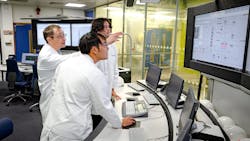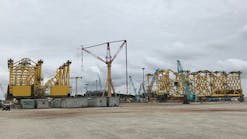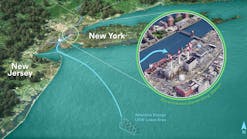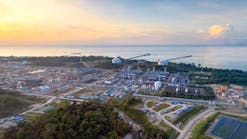Jeremy Beckman * Editor, Europe
LONDON – ABB and Imperial College London (ICL) have renewed their partnership in a carbon capture pilot plant by a further 10 years. The four-floor facility, located at the college in central London, allows engineering students to simulate a range of scenarios involving processing and handling of captured CO2.
ICL is said to be one of the world’s top-ten universities in terms of teaching and research, and the sole university in the UK to focus on engineering, science, medicine and business.
The pilot plant, which opened in 2021, was intended partly to encourage students to consider a career in the fledgling carbon capture and storage sector. At the time there were two CCS schemes operating in which captured carbon was injected into subsea reservoirs, both operated by Equinor at the Sleipnir and Snøhvit fields offshore Norway to separate CO2 from produced gas-condensate.
Over the next few years, more complex developments are set to go forward in the North Sea region involving capture of CO2 emitted by multiple industrial sites with different chemical compositions. Following processing/compression, the commingled CO2 will be transported through onshore and offshore pipelines for storage in depleted fields off Denmark, the UK and the Netherlands.
Similar projects are under review in Malaysia and Thailand.
Managing the process, which at present carries many unknowns in terms of the behavior of the CO2 through the CCS network, will require new skills, and the ICL plant aims to provide a basis for those thinking of entering the industry. The experience gained by students at the plant and their performance handling various tasks count towards their engineering degrees.
The plant, which cost around £10 million ($12.76 million) to design and construct, including an upgrade to ICL’s teaching laboratories, is said to be the sole facility of its type at any academic institution worldwide. Over the years since, ABB has supplied much of the instrumentation, controls, process equipment and software to help replicate operating conditions expected in future CCS projects.
The site contains over 250 instruments for measuring temperature, pressure, carbon-dioxide (CO2) and flow. ABB System 800xA automatically controls and coordinates all aspects of the process which students and technicians can visualize or monitor on displays in the main control room.
During operation, all four floors of the process are employed. The ground floor is predominantly the liquid handling area, where heat transfer performance of the interchanger exchanger and re-boiler can be investigated. On the second floor, students can examine the heat transfer performance of the trim cooler.
The third floor has site glasses, allowing for direct viewing of the fluid distribution processes occurring within the columns. From the control room on this level, students can monitor the stage-by-stage mass transfer process occurring within the absorber using non-dispersive infra-red gas analysers.
On the top floor is the gas handling part of the process: any related parameters can be monitored locally or via the control room.
For teaching purposes, a simulated flue gas is used, however the composition of this can be varied from around 5% to 30% CO2 by volume, replicating typical values encountered in many processes.
As a training facility, the pilot plant is run more like a batch process to give students the experience of standard operating procedures for start-up and shut-down. As part of the sessions on the plant various scenarios can be introduced, such as blocked impulse lines on differential pressure measurements, with students tasked with attempting to trouble-shoot these problems.
The plant was designed to process around 500 metric tons/yr. Since it is used mainly as a teaching facility, the process is a closed-loop system in which the gases are recycled and re-used multiple times. The solvent is spread between the columns to minimize inventories. Monoethanolamine (MEA) is used in this process since it is a long-established solvent with substantial information available, allowing the students to compare their data to openly available values from elsewhere.
Since this is an ongoing collaboration between Imperial College and ABB, the instrumentation has been continuously upgraded. More recently, cyber secure cloud-based verification systems have been added, reflecting developments in the preventative maintenance area.
Many of the students have since gone on to work in the carbon capture and storage industry as consultants, contractors, EPC technicians and operators. ABB also uses the ICL pilot plant in tandem with its own training facilities to instruct its technicians.
The company has developed an Advanced Process Control solution as part of its digital products portfolio and is considering adding this to the ICL facility. This is said to minimize the energy consumption required in carbon capture, which is an energy-intensive process. The company can also provide other ways of cutting costs though loop tuning.
12.14.2023






